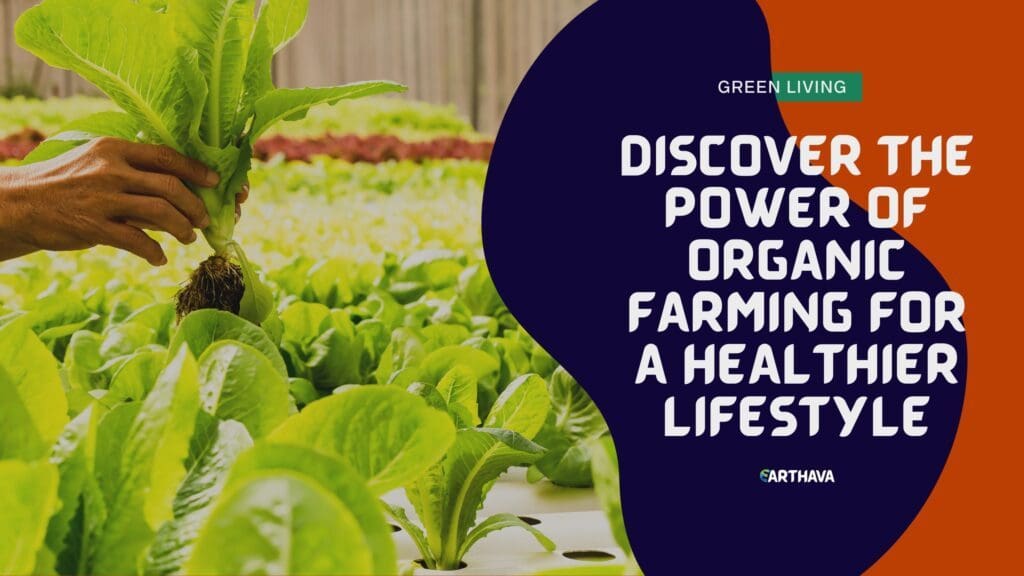Organic farming offers a sustainable and environmentally friendly approach to agriculture, promoting healthier ecosystems and producing nutritious, chemical-free food. In this exploration, we will uncover the power of organic farming for a healthier lifestyle. From the benefits of consuming organic produce to the impact of organic farming practices on soil health and biodiversity, we will delve into the numerous advantages of choosing organic. Additionally, we will discuss how organic farming methods contribute to reducing the use of synthetic pesticides and fertilizers, thereby minimizing environmental pollution and promoting a more sustainable food system. Whether you’re passionate about healthy living, environmental conservation, or supporting local farmers, embracing organic farming can lead to a more vibrant and sustainable lifestyle.

What Is Organic Farming?
Organic farming is a form of farming that relies on various agricultural practices that limit the use of chemicals and synthetic fertilizers during production. Such practices include crop rotation, mixed cropping, the use of green manure and compost manure, and biological pest control. Pesticides used in organic farming are those that are deemed natural such as extracted pyrethrins and animal bone meal. Petrol-based pesticides are not used in organic farming.
Organic farming offers ecological sustainability and balance of nature by using minimal off-farm inputs in agriculture by encouraging and improving biodiversity, soil biological activity, and biological cycles. This helps in preserving the environment and typically prevents harm to the soil, water, and animals. Organic farming uses farm management techniques that restore, enhance, and maintain the ecological harmony of an area.
Organic Farming Techniques
Organic farming uses farm management techniques that restore, enhance, and maintain the ecological harmony of an area.
Inorganic plant farming, The control of weeds and pests is done in a way that there is no application of chemicals. Weeds are mowed down, uprooted, and heat-treated to kill the weeds and use mulch to prevent weed growth. Bio-control is also used.
Animals that eat weed plants such as geese are used. In cotton, cotton patch geese are reared to eat the weeds that grow among the cotton plant. Inorganic rice cultivation, fish and ducks are kept in the rice paddies to eat the weeds.
Another technique is to cover cropping such that the weeds have no place to grow. The various weed management practices see to it that the organic materials in the weed plants are recycled within the farm ecosystem.
To control pests, predatory insects can be introduced and encouraged. These are insects that will not harm the crop of interest but will predate on pests. They are given a habitat in the form of a hedgerow beetle bank or shelterbelt. Many farmers use sanitation to remove pest habitats where they are not needed, provide companion crops to the main crop, and apply minimum tillage to create false seedbeds.
Crop rotation is another technique used as it interrupts pest reproduction cycles. One can plant pest-repellent plants that will divert or discourage pests. Insect trapping has also been used quite effectively to control insect pests. Biologic pesticides are used to some extent if they are derived naturally and do not contain any synthetic chemical compounds
Methods
The common method of organic farming called integrated pest control utilizes several pest and weed control techniques together. The combining of several techniques simultaneously ensures effective control while giving the farmer the desired non-use of chemicals and off-farm materials.
The organic farmer finds that by having an integrated system of labor provision and renewability of his farm, there is more profitability and energy efficiency. This is because there is less labor intensification and the prices of organic food are higher thus greatly increasing the income to the farmer.
Benefits
The benefits that are afforded by organic farming practices do not end with the farmer alone. The consumers of organically grown food have greater reason to smile. They will be sure that the food they are consuming is grown in a healthy way that puts them at no risk of contracting diseases or disorders that can be caused by eating food that is grown in conventional intensive methods.
The limited use of pest and weed control chemicals to those that are extracted naturally eliminates the exposure of consumers to carcinogens and other harmful chemicals. There is also a benefit to the environment. Labor supplied by farm animals leads to reduced emissions of carbon compounds from burnt fuel used in heavy farm machinery.
Take Notice
More farmers are turning to organic farming and even health professionals advocate for the use of organically grown food. With the advantages of organic farming in mind, try an organically grown product today and you will be sure you are saving our planet.


